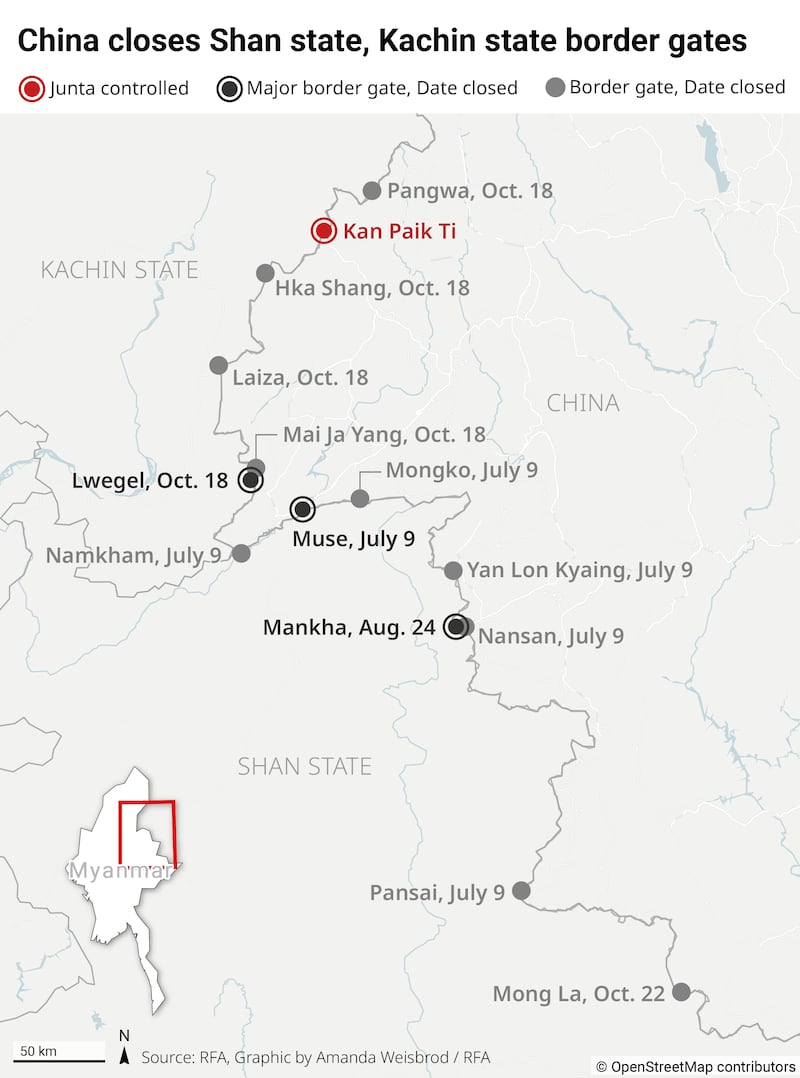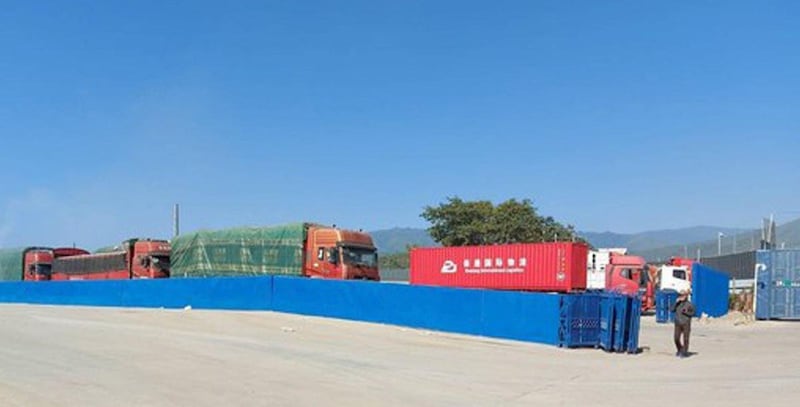Read RFA coverage of this topic in Burmese.
China has imposed restrictions on the transport of goods along its border with northeastern Myanmar’s Shan state in its latest bid to pressure ethnic rebels into a ceasefire with the military junta.
But residents say the moves have caused the price of essential supplies such as rice, fuel and medicine to nearly double.
Last October, the Three Brotherhood Alliance of ethnic armies launched an offensive codenamed Operation 1027 that pushed back the military from several regions in Shan state it controlled following its February 2021 coup d’etat.
In January, China helped to negotiate an end to hostilities between the junta and the alliance – made up of The Ta’ang National Liberation Army, Arakan Army and Myanmar National Democratic Alliance Army – but the alliance resumed attacks in Shan state in late June following the lifting of the ceasefire.
A trader in Muse township told RFA Burmese that beginning Oct. 22 China has banned the transport of electrical equipment, building materials and mobile phones through the Kyalgaung gate, which separates Muse from China’s Dehong Dai and Jingpo Autonomous Prefecture in Yunnan province. Another gate serving the area was closed off entirely in July.
“Electronic equipment, solar panels, and engine oil are strictly prohibited,” said the trader who, like others interviewed for this report, spoke on condition of anonymity due to security concerns. “If any online communication-related items are found, a four-year ban [on entry] will be imposed.”

The trader said that inspections have become more stringent in recent days and that authorities in both China and Myanmar “are rigorously enforcing these restrictions.”
The reason for the restrictions has not been officially disclosed, he said, although residents of Muse told RFA that China’s enforcement became more strict “after bulletproof vests and helmets were seized at the border a few days ago.”
Multiple gates closed
Since July, China has closed more than a dozen border crossings near areas controlled by ethnic armed groups in Myanmar – including the major border gates of Kan Paik Ti, Lwegel, Kyin San Kyawt, and Nansan – to pressure them into a ceasefire with the military in northern Shan state.
The latest was the Mong La border gate, which Chinese authorities shuttered on Tuesday. The gate separates Shan state’s Mong La township from China’s Xishuangbanna Dai Autonomous Prefecture in Yunnan province.
RELATED STORIES
Myanmar rebels capture border base near Chinese rare-earth mining hub
China denies entry to Myanmar nationals trapped by battle
Myanmar rebels capture border base near Chinese rare-earth mining hub
Residents told RFA that the closures have led to shortages of supplies such as rice, medicine, food, consumer goods and machine oil which could be used by rebel groups, but are also essential for the civilian population.
In addition to the closures, China has restricted access to water, electricity and the internet, they said.
On Aug. 24, China blocked the Mankha border gate, which separates Shan state’s Namtit township from Yunnan’s Cangyuan Va Autonomous County.
Namtit is controlled by the United Wa State Army, or UWSA – Myanmar’s largest ethnic army, which vowed in November to remain neutral as the Three Brotherhood Alliance began Operation 1027 against junta forces.
On Aug. 27, China’s Special Envoy to Myanmar, Deng Xijun, met with top UWSA leaders in Yunnan’s Pu’er City. Deng urged them to prevent food and medicine from being transported from areas under their control to areas controlled by the Three Brotherhood Alliance, and the UWSA complied.
Prices ‘nearly doubled’
A trader from an area under UWSA control told RFA that inspections have become so strict that “even carrying a full bottle of water is prohibited.”
“People from Kunlong, Namtu, and Chinshwehaw [townships] are now limited to trading within their own areas, and residents on this side [controlled by the UWSA] can only trade within theirs,” said the trader, who also declined to be named. “Since traders from Kunlong can no longer bring goods back after selling here … they no longer come here to trade."
Since the launch of Operation 1027, the junta has blocked the transport of essential goods, including rice, fuel and medicine to the northern towns of Shan state from other parts of Myanmar, causing residents to become heavily dependent on supplies from China.
But residents of Shan state told RFA that with Chinese goods no longer moving through several border gates, the prices of food and consumer products “have nearly doubled.”
“Since this area is blocked, it’s becoming harder for goods to come in, and prices will continue to increase,” a resident of Hsenwi township told RFA.

A resident of Kutkai township said price increases are even steeper for medicine.
“If we need medication, we have to rely on traditional remedies,” he said.
Shortage of engine oil, medicines
Ta’ang National Liberation Army, or TNLA, spokesperson Lway Yay Oo told RFA that her group is working to ease access to fuel and medicine in Namsang, Manton, and Namtu townships, which are facing the greatest difficulties.
“There is a significant shortage of engine oil, and transporting medicines is also quite challenging,” she said. “We are currently working hard to address these issues, as these two areas are the most problematic.”
China continues to pressure the TNLA to cease hostilities, she added.
The TNLA has not indicated how it plans to respond to this pressure.
RFA has reached out to the Chinese Embassy in Myanmar regarding the closure of border gates and restrictions on the transport of goods, but had received no response by the time of publishing.
Translated by Kalyar Lwin. Edited by Joshua Lipes and Malcolm Foster.
